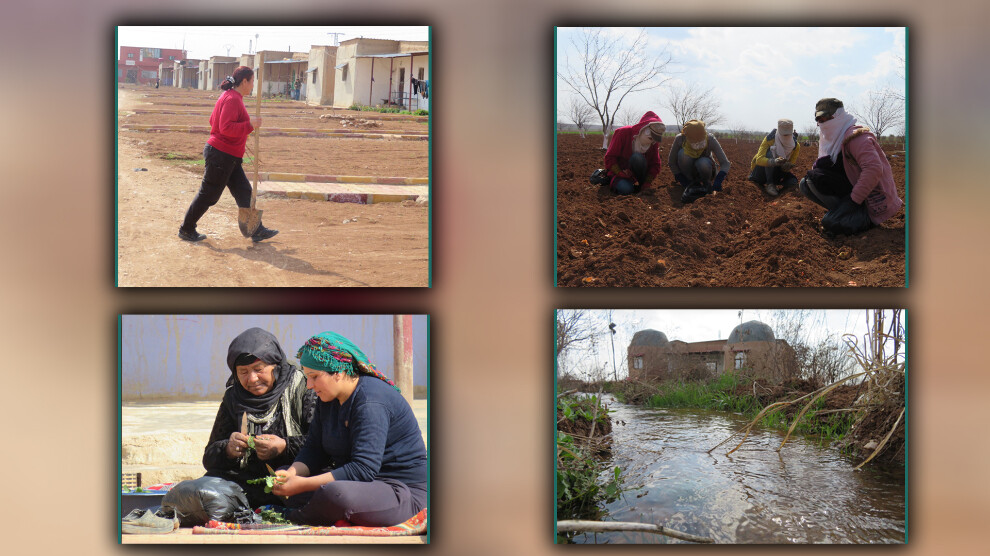Barîn Hecî who lives in Jinwar: “When I die, bury me here”
Barîn Hecî, who ran away secretly and got married to her cousin, 30 years older than her, in order not to force into marriage with a man her family would choose, suffered for many years because of her wrong choice.

Barîn Hecî, who ran away secretly and got married to her cousin, 30 years older than her, in order not to force into marriage with a man her family would choose, suffered for many years because of her wrong choice. She now lives in Jinwar village, all-women’s village, with her three children. “Now, I am happy in the village. When I die, bury me here because I feel alive and happy here,” she said.
SARA KEREM
Hesekê – Barîn is a Kurdish word meaning “Rain” in English. All living creatures need rain to renew themselves. In the past, women were named after something in nature because women were valuable as nature. Women always kept their society alive because women were the pioneers of their society in every part of life. Women were the source of knowledge and solutions. But in time, their role in society changed due to the patriarchal mindset.
She thought what she faced was her destiny
30-year-old Barin Hecî, the mother of three, lives in Jinwar village with her children now. Like many women, she was deceived, harassed, and betrayed by a man. She didn’t know anything about the struggle of women for years. She thought what she faced was her destiny. Barin Heci, the youngest child of her family, only knew her village, she didn’t go out of her village until she was 20 years old. She knew only her relatives and family members. She thought she was a burden for her family like her oldest sisters. Her family forced her sisters into marriage without asking for their consent. Barin Hecî felt unworthy and unloved. Her uncle’s son, who is 30 years older than her, realized that Barin needed love, confidence and someone who cared for her.
“If I hadn't run away, my family would have forced me into marriage”
Barîn Hecî told us that she had been deceived by her cousin. “He always tried to tell me how he was a good person. He told me he was my cousin so that he wouldn’t harm me; he would always love me and never leave me alone. But he asked me to run away with him. I was scared but I trusted him because he was my cousin. If I hadn't run away, my family would have forced me into marriage. So I ran away with him.”
“I was left without food in the house for days”
Barîn Hecî went to Hesekê with her cousin. “I was confined to home. I couldn’t return to my family anymore and I didn’t feel safe with him. My cousin, my husband went out and didn’t come back for days. I was left without food for days. A year later, I gave birth to my daughter and named her Hope. She becomes my hope. Then, my husband didn’t come home for months. My husband was in debt and people came to our house to ask for their money back. Whenever my husband came back, he used violence against me and then left the house again.”
“They took my daughters from me”
Pointing out that she has three daughters from her marriage, Barîn Hecî said, “I wanted to leave my husband but my husband’s family, my uncle, took my daughters from me. My family didn’t accept my daughters. I felt so helpless. My daughters were taken from me; I didn’t have any place to go. All I wanted was living with my children.”
Barîn Hecî began to work in order to take her children back. A month later, her husband’s family left her children in Mala Jinê (Women’s House, a kind of women’s shelter). When Barîn Hecî heard that her children were in Mala Jinê, she wanted to take them back but her family didn’t allow her. “My family didn’t accept my children. So I decided to tell the women working for the Mala Jinê what I faced. They supported me,” she told us.
Her life changed in Jinwar
Barîn Hecî now lives in Jinwar with her daughters. “Now, I am happy in the village. When I die, bury me here because I feel alive and happy here. In the village, I learned how living together is. I also see how women are stronger and more creative. Young women shouldn’t believe men and get married at a young age. They should choose life, not death.”
